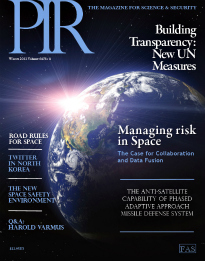Winter
CONTENTS:
President's Message:
Securing Nuclear Materials: Remaining Challenges
Q&A:
Harold E. Varmus, Nobel laureate in medicine and director of the National Cancer Institute, was
interviewed about many of the issues of concern to the FAS founders that exist today. Previously he served as President and Chief Executive Officer of Memorial Sloan-Kettering Cancer Center (MSKCC) and as Director of the National Institutes of Health (NIH).
Duly Noted:
Ambassador Steven Pifer of the Brookings Institution and Dr. Ariel Cohen of the Heritage Foundation disuss the proposed missile defense system from the NATO and Russian perspectives respectively.
Book Review:
Merchants of Doubt - How a Handful of Scientists Obscured the Truth On Issues From Tobacco Smoke to Global Warming by Naomi Oreskes and Erik M. Conway.
Film Review:
The Forgotten Bomb by Bud Ryan and Stuart Overbey.
FEATURES:
Rules of the Road: Responsible Use of Weapons in Space
Should a major outage of satellite capacity occur, financial and trade markets could collapse, a recession
spanning the globe would ensue, and security tensions would exacerbate. Should the United States seize the
initiative and secure low-Earth orbit while its allies are unchallenged in space?
Managing Risk in Space
Since the launch of Sputnik in 1957, governments and commercial companies have placed thousands of satellites in orbit around the Earth. Today, there are more than 16,000 active satellites and debris in the public catalog of tracked objects. Governments and businesses operating spacecraft need to take a new approach to enhance the safety and efficacy of the space environment.
The Anti-Satellite Capability of the Phased Adaptive Approach Missile Defense System
On February 14, 2008, General James Cartwright announced the United States would destroy a nonresponsive intelligence satellite soon to re-enter the Earth’s atmosphere using the Aegis sea-based missile defense system. While framed as a public safety measure, some observers expressed skepticism that this risk was the real or entire motivation for the exercise. The interception demonstrated the ASAT capability of the U.S. Aegis sea-based missile defense system.
How to Work in the New Space Security Environment
More than 40 countries operate satellites in orbit. The increasing number of players presents a new and challenging space security environment that demands new approaches.
Transparency and Confidence-Building in Outer Space: Inching Toward Action
Although concerns about the safety and security of humankind’s operations in outer space have been with us since the dawn of the space age in 1957, the past decade has seen a steady increase in attention to the issue at the multilateral level. How do we best coordinate international efforts?
RESEARCH REPORT:
How to Make Twitter Available in North Korea
Devabhaktuni Srikrishna and Rajeev Krishnamoorthy write about how citizens with wireless mesh-enabled smart phones might overcome government censorship.
------------------------------
The PIR welcomes letters to the editor. Letters should not exceed 300 words and may be edited for length and clarity.
LETTERS TO THE EDITOR
Public Interest Report
1725 DeSales Street, NW
6th Floor
Washington, DC 20036
PHONE: (202) 546-3300
FAX: (202) 675-1010
EMAIL: [email protected]
The Public Interest Report is a quarterly magazine for science and security published by the Federation of American Scientists. The magazine is supported by membership contributions, subscriptions, and advertising.
FOR ADVERTISING Call (202) 454-4680 or email [email protected].

